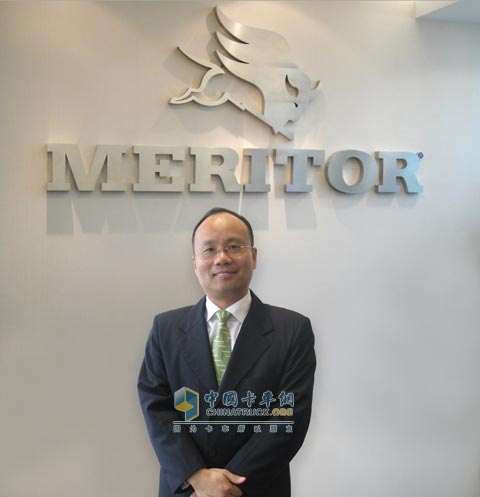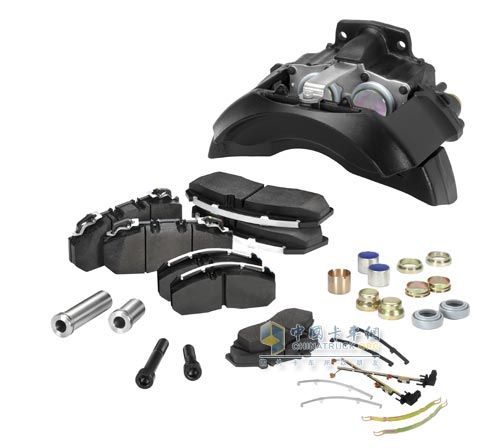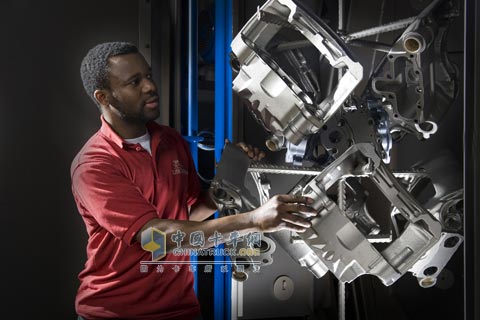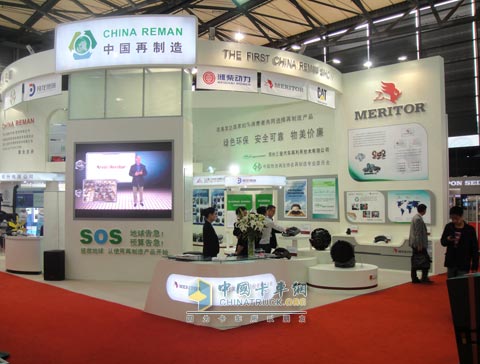With the rapid growth of the Chinese economy in recent years, how to achieve sustainable development has increasingly become a topic of widespread concern for the Chinese government, enterprises, and society. The National "Twelfth Five-Year Plan" outline clearly states that the government will vigorously develop circular economy as a major strategy for China's economic and social development. As an important part of the recycling economy, remanufacturing will undoubtedly become a new growth point in the development of China's auto industry. However, when many international auto parts giants took over the Chinese auto aftermarket and planned for the development of remanufacturing development plans, they found that the progress of their remanufacturing business in the Chinese market was not as smooth as in the European and American markets. As a global leader in commercial vehicle parts and components, US Meritor has been closely watching the development of the Chinese automotive remanufacturing industry. We had the privilege of interviewing Mr. Wang Shangqian , General Manager of Meritor's Aftermarket Division in China , and asked him to talk about some related issues of domestic auto parts remanufacturing. Reporter: Can you talk about the development status of the domestic auto parts remanufacturing industry? Wang Shangqian: Compared with the developed auto parts industry in the West, China's remanufacturing industry has just emerged and is still in its infancy. However, to be sure, China's auto parts remanufacturing has a very huge development prospects. In the United States, which has approximately 285 million cars, the company has more than 50% of its national auto parts aftermarket sales from remanufactured parts. In 2010, the US auto parts remanufacturing market reached US$40 billion, accounting for more than 40% of the global remanufacturing market. In China, as of the end of 2010, the number of car ownership has exceeded 85 million, but the proportion of auto parts remanufacturing is very low, almost zero. After China's auto production and sales exceeded 18 million in 2010, the development of China's auto industry will maintain steady growth in the next few years. If conservatively calculated at an annual growth rate of 10%, by 2016 domestic civil car ownership will exceed 200 million vehicles, after 2020, it is expected to reach a peak of about 350 to 400 million vehicles. As a result, the scale and prospects of China's auto parts remanufacturing market will be very broad if the number of developed countries’ auto ownership and the remanufacturing industry are developed and proportioned. China's auto parts remanufacturing industry should be said to have started late. It has only just begun during the national "Eleventh Five-Year Plan" period. In 2008, the National Development and Reform Commission initiated the pilot work of the auto parts remanufacturing industry, and 14 remanufacturing enterprises were listed as pilot units. In January 2009, the “People’s Republic of China Circular Economy Promotion Law†came into effect. This law describes remanufacturing six times in Articles 2, 40 and 56. This signifies that the remanufacturing industry has been listed as an important part of the country’s promotion of recycling economy. The components also indicate that the country has incorporated remanufacturing into legal channels. In 2010, remanufacturing was again listed as a national "Twelfth Five-Year Plan" strategic emerging industry. In general, I think the government's understanding of the significance of the remanufacturing industry to the national economy is profound. With the national plan to include remanufacturing in the energy conservation and environmental protection industries, China's auto parts remanufacturing industry is also faced with excellent historical development opportunities and is about to enter the fast track of comprehensive development. If the "Eleventh Five-Year Plan" is the initial stage of China's auto parts remanufacturing industry, then the "12th Five-Year Plan" period will be a major stage of development of the industry. I believe that the next five to ten years will be of great importance. The country will accelerate the formation of a remanufacturing economy and effectively stimulate domestic demand. This will be a rare opportunity period for the development of China's remanufacturing industry. Reporter: As the head of the multinational auto parts company's post-sales business in China, do you think that there are any difficulties and challenges in the current remanufacturing business in China? Wang Shangqian: There are indeed some difficulties and challenges, mainly concentrated in policies and regulations, technical factors and market awareness. First, China has not yet established a relatively independent and sound legal system to solve many problems surrounding the remanufacturing of this industry. This is a problem for many international auto parts remanufacturing companies. They have high enthusiasm and want to participate in the auto parts remanufacturing field in China. However, it is difficult to find specific regulations as a guide, and there is no corresponding government department to understand. Situation or business consulting and docking. Second, the remanufacturing industry does not currently have a clear access system. At present, what everyone knows is that the National Development and Reform Commission identified 14 companies in 2008 as pilot sites for the remanufacturing of auto parts. The Ministry of Industry and Information Technology released the first batch of 35 units at the end of 2009 as a pilot project for remanufacturing implementation of electromechanical products. A few years later, the government has not provided any relevant documents to specify the conditions for entering the remanufacturing industry. Many social enterprises do not even know how to enter. Some of the first batch of 14 companies approved a few years ago were enrolled, and some were named after consultation with large companies. At that time, the market did not know about remanufacturing, and the companies that signed up were also tentatively joined after they knew the news in a small area. More companies did not know this information. With the increase of car ownership, the remanufacturing industry of auto parts is gradually being favored. Various investment entities, including mature foreign-funded parts and components remanufacturing companies, are also expected to get involved, but they do not know which department to look for. formalities. If the access system is not clear, it will not be able to stimulate the enthusiasm of more extensive enterprises. To put it another way, in the current stage, more companies wishing to participate in the remanufacturing industry are kept out of the door, which is not conducive to the development of China's auto parts remanufacturing. Third, it is difficult to offset the sales tax in re-manufacturing enterprises' VAT. Generally speaking, as an ordinary taxpayer, the VAT payable amount is the current sales tax minus the current input tax. However, since the remanufacturing enterprise purchases scrapped parts from the customer, the company cannot obtain the input tax invoice, and when the company sells the restored product to the customer, it needs to issue the sales tax invoice for the product. Since there is no input tax invoice for an enterprise, there is no way to offset the input tax, which results in an increase in the cost of remanufactured products, which has to be passed on to consumers. The current problem of value-added tax on the irrationality of remanufactured enterprises on the one hand can not stimulate the industry's investment enthusiasm, on the other hand, it has virtually increased the price of remanufactured products. Fourth, old parts are difficult to recycle. In the remanufacturing project, the old part that meets the remanufacturing production is the key to the raw material. If there is no old part, there is no way to talk about remanufacturing. However, the recovery and use of old parts of domestic auto parts has been subject to various restrictions in terms of policies. This is a big bottleneck. If the remanufactured enterprise does not have a source of old parts and cannot establish a complete reverse logistics system, it will not be able to carry out a truly remanufactured mass production business at all. Fifth, the overall technical level of domestic remanufacturers is uneven. Remanufacturing production is to open all old parts, dismantling, cleaning, testing and classification according to specific processes, remanufacturing processing or replacement of failed parts, and product reassembly, and finally it will be delivered to the market after rigorous testing. Some enterprises that have obtained re-manufacturing licenses in China can achieve a relatively standard level, but compared with their international counterparts, there is still a big gap in terms of technology and quality control. This may also be one of the factors that government departments do not dare to let the remanufacturing industry let go. More companies that do not have manufacturing qualifications will be involved, and eventually the whole industry will not be controllable. Some companies also confuse the concept of remanufacturing, refurbishment, and maintenance, and it is even more impossible to guarantee the quality of "remanufactured" products. Finally, how to increase the market awareness of auto parts remanufactured products is also a key issue. Due to the public's misunderstanding of the automotive remanufacturing industry, understanding and support for car remanufacturing is not enough, and remanufactured products are currently limited to the hands of consumers. Therefore, how to increase positive propaganda and promote the green concept, product performance, and service life of auto parts remanufacturing to the society are all practical issues that the government and enterprises must face. Reporter: You just mentioned the issue of recycling of remanufactured old parts. Can you elaborate on that again? Wang Shangqian: The difficulty in recycling old parts is one of the major bottlenecks in the development of the domestic remanufacturing industry. The concrete manifestations are the poor recovery of old parts in China and the limited import of foreign old parts. This restriction comes from the National Decree No.307 and No.37. According to Article 14 of the State Council's Decree No. 307 “Administrative Measures for the Retirement of Scrapped Automobilesâ€, a scrapped automobile recycling company must dismantle the recovered scrapped automobiles. Among them, the dismantled "five major assemblies" (automobile engines, steering engines, transmissions, front and rear axles, and frames) should be used as scrap metal and sold to iron and steel enterprises as smelting raw materials. In addition, there are many high-value-added products in the assembly of these five mandatory scrapped vehicles. After remanufacturing old products that can be reused, they are all recycled as scrap metal. This is a great waste of resources. It also objectively caused the domestic remanufactured companies to lack the source of old parts. In the European and American markets, multinational corporations set up remanufactured factories with different functions according to their own layout. The models of these remanufacturing factories are also adapted to the global circulation model. However, the existing regulations in our country impose restrictions on the import of old parts. In the No. 37 Order issued by the General Administration of Quality Supervision, Inspection and Quarantine of the People's Republic of China on the Inspection and Supervision of Imports of Used Machinery and Electronic Products, the import of old parts, the so-called “foreign garbageâ€, is prohibited. In 2010, the inspection and supervision policy for importing used mechanical and electrical products was introduced again, but the definition of remanufactured blanks affiliated with old products or other available raw materials has not yet been resolved. The import of remanufactured old parts is restricted in China. This is similar to the situation in India, which has brought resistance to some global remanufactured enterprises. It is not conducive to multinational auto parts companies using Chinese foreign resources to enrich old parts. Large-scale remanufacturing production cannot completely open up the global system of after-sales service for parts and components. At present, over 90% of the old parts of remanufactured enterprises in China are the failures within the three-period period obtained through their controllable OES channels or special maintenance outlets, or the companies are developing new products or scraps in the production process. The proportion of remanufactured old parts out of the three-packet period obtained from independent aftermarket channels (IAM) is very limited. It is worth mentioning that the foreign remanufacturing industry does not require companies that must be authorized by the original factory or factory to be able to carry out remanufacturing. Remanufacturing is completely open and does not require authorization. This is very conducive to market competition, various types of remanufactured enterprises in the area of ​​independent after-sales market for the remanufactured old parts of the 'contention' to promote the sound development of the industry as a whole, and its social and economic benefits are also significant. However, at home, the current NDRC policy is to allow only 14 remanufactured companies that have already approved to do remanufacturing of their own products. Other companies cannot remanufacture their products unless authorized. However, due to the profitability and self-protection of these companies, most of them will not authorize competitors or independent remanufacturers in the market. In short, our market lacks a good mechanism and a smooth network to ensure the free circulation of remanufactured old parts. The development of remanufacturing requires the establishment of a complete reverse logistics system, but the reverse logistics recovery system for old parts of auto parts is still largely blank in our country. Reporter: Can you tell us about Meritor's global remanufacturing business? Wang Shangqian: Meritor is the largest remanufacturer in the chassis drive system for North American commercial vehicles. Its remanufacturing business can be traced back to 1982. Over the past 30 years, Meritor has used its expertise and experience in product design of commercial vehicle parts and its unique manufacturing process in remanufacturing products to ensure that it produces the highest quality remanufactured products. Meritor covers almost all commercial vehicle chassis and transmission system components remanufactured product lines: drive axles, trailer axles, transmission systems, brakes, manual gearboxes, steering systems, automatic gearboxes and pneumatic systems. The company currently has nine remanufacturing plants in North America, Europe and Asia. Meritor remanufacturing is not like simple reconstruction or repair, but an industrialization process. The old parts are subjected to professional disassembly, cleaning, component inspection and testing, repair and surface treatment, etc., making their quality not lower than the quality of OE new products, and the customer purchase cost can be reduced by about 50%, and get the same quality service as the new OE products. Assurance saves users significant maintenance costs. In addition, Meritor has a strong supply of spare parts for remanufacturing production. The company uses Meritor's global procurement platform to support the remanufacturing of Meritor's own original branded products, while leveraging the reverse engineering capabilities of powerful new commercial vehicle parts and components development, it has high added value in the market and advanced competitors. The products are remanufactured and developed, and ensure that Meritor's newly developed remanufactured products meet or exceed the competitors' new product quality standards. With its perfect reverse logistics, distribution network and advanced remanufacturing technology, Meritor has an excellent reputation and a wide customer base in the European and American markets. The three remanufactured brands, Meritor, Mascot and TruckTechnic, represent superior quality, outstanding innovation capability and extremely rich commercial operating experience. While maintaining the growth of remanufacturing business in Western developed markets, Meritor has turned its attention to opportunities for remanufacturing businesses in emerging markets, especially in the Asia Pacific region. Meritor set up a remanufacturing center in Australia this year, while strengthening the promotion of the remanufacturing business in the Chinese market. Reporter: The "China's first physical exhibition of auto parts remanufacturing products" held by Meritor at the Shanghai International Auto Show in April this year has aroused widespread concern. Can you talk about the specific situation? Wang Shangqian: In April this year, at the 2011 Shanghai International Auto Show, the world’s second largest auto show international platform, Meritor and China Recycling Association Remanufacturing Committee, Weichai Power, Caterpillar and other domestic companies Pilot manufacturing companies jointly organized the "China's first physical exhibition of auto parts remanufacturing products." At this exhibition, Meritor launched its first three remanufactured brands, Meritor, Mascot, and TruckTechnic, to Chinese consumers, demonstrating its advanced remanufacturing technology and products (including commercial vehicle automatic transmissions and disc brake calipers. , steering gear, etc.) have aroused public interest. Remanufactured products have no less than the new product's quality performance, the same warranty period, but its sales price is only 40-60% of the price of new products. Compared with new products, remanufactured products can save energy by 60%, save 70% of materials, and reduce air pollutant emissions by over 80%, which is of great practical significance for energy conservation and emission reduction. In China, auto parts remanufacturing is still a government-dominated regulation discussion and technology as an emerging industry The embryonic stage of pilot and policy trials. At present, many conferences and forums related to remanufacturing are mostly limited to the research and discussion of experts, scholars, officials, and related personnel in the industry. They are "closed-door retreats." The original intention of Meritor’s remanufacturing physical exhibition is to give end users an intuitive, systematic and comprehensive understanding of the opportunities for remanufactured products, and to promote the three major concepts of “green, reliable, and cost-effective†for remanufactured products. . In addition, I also participated in the remanufacturing industry forum held in Shanghai, Beijing, and Hangzhou as a special guest and host this year to introduce the global successful experience of the Meritor remanufacturing business and actively seek to develop the remanufacturing business in the Chinese market. Opportunity. Reporter: What is the progress of Meritor's remanufacturing business in the Chinese market? Wang Shangqian: The remanufacturing business is an important supplement to Meritor’s product line of China's commercial vehicle aftermarket business. Like most multinational parts and components companies, our post-sales business in China is facing a large number of low-quality, counterfeit counterfeit parts. Remanufactured products are widely considered to be inexpensive (prices are around 50%-60% of the new sales price), reliable quality, and green alternatives. Judging from the long-term development trend, remanufactured products will surely be favored by more and more customers and become effective weapons against foreign counterfeit and inferior products. Therefore, vigorously promoting remanufactured products will be one of our important strategies for launching after-sales services in China. Meichi is currently the largest independent axle manufacturer in China's non-road sector. With the rapid development of China's non-road business in recent years, the market share of Meichi Axle has expanded rapidly. To this end, the company set up a special recycling department in Xuzhou to effectively manage and re-use the remanufactured parts. To explore the standard process of the Chinese remanufacturing business, the company developed a recycling system for the old part of the reverse logistics, and took a solid step forward. The first step for Meritor to develop its remanufacturing business in China. In the field of roads, Meritor products are mainly used in domestic high-end buses and buses, including some imported European and American vehicles. Meritor and major domestic bus companies have conducted effective discussions on remanufacturing and have high hopes for potential cooperation opportunities. At this Shanghai International Auto Show, Meritor's Truck Technic remanufacturing technology introduced to the Chinese market provides commercial vehicle customers with a very clear standard and operating procedures for remanufacturing remanufactured disc brake calipers, and has recommended Meritor This type of remanufactured product quality inspection standard, widely accepted by users in Europe and the United States, guarantees the reliability and safety of remanufactured products from remanufacturing technologies, processes, and inspection methods. As mentioned earlier, remanufacturing is still in its infancy in China. We are still faced with many difficulties and challenges. We will actively communicate with and communicate with relevant national and industry experts. We also hope that the government departments will establish a sound mechanism to support the development of auto parts and remanufacturing businesses as soon as possible so that this industry can be quickly and widely implemented in China. Remanufacturing industry originated and matured in Western developed countries, Meritor will be committed to the company's advanced remanufacturing business model in Europe and the United States to introduce the Chinese market, support the national recycling economy, and promote advanced green manufacturing. Woven Screen Filter Discs,Woven Filter Cloth,Woven Screen Filter Discs Disc,Woven Screen Filter Discs Medium HEBEI KANGLIDA METALNET CO.,LTD. , https://www.kldmetalnet.com
Mei Shang, General Manager of Meritor's Aftermarket Division in China 
Mei Chi disc brakes aftermarket products 
Meritor Remanufactured Samples 
Shanghai Auto Show Meritor Remanufacturing Booth